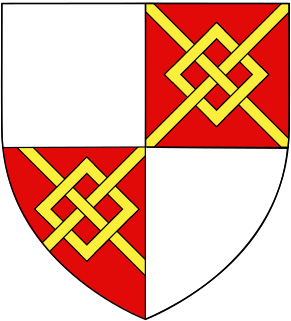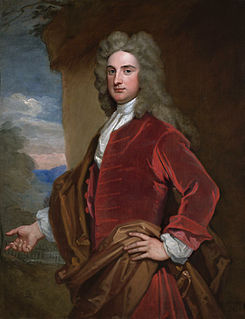
Marquess of Bath is a title in the Peerage of Great Britain. It was created in 1789 for Thomas Thynne, 3rd Viscount Weymouth. The Marquess holds the subsidiary titles Baron Thynne, of Warminster in the County of Wiltshire, and Viscount Weymouth, both created in 1682 in the Peerage of England. He is also a baronet in the Baronetage of England.

Marquess of Anglesey is a title in the Peerage of the United Kingdom. It was created in 1815 for Henry Paget, 2nd Earl of Uxbridge, a hero of the Battle of Waterloo, second in command to the Duke of Wellington. The Marquess holds the subsidiary titles of Earl of Uxbridge, in the County of Middlesex, in the Peerage of Great Britain (1784), Baron Paget, de Beaudesert, in the Peerage of England (1553), and is also an Irish Baronet, of Plas Newydd in the County of Anglesey and of Mount Bagenall in the County of Louth.

Earl of Chichester is a title that has been created three times, twice in the Peerage of England and once in the Peerage of the United Kingdom. The current title was created in the Peerage of the United Kingdom in 1801 for Thomas Pelham, 2nd Baron Pelham of Stanmer.

Earl of Lonsdale is a title that has been created twice in British history, firstly in the Peerage of Great Britain in 1784, and then in the Peerage of the United Kingdom in 1807, both times for members of the Lowther family.

Viscount St Davids, of Lydstep Haven in the County of Pembroke, is a title in the Peerage of the United Kingdom. It was created in 1918 for John Philipps, 1st Baron St Davids. The Philipps family descends from Sir John Philipps, who represented Pembrokeshire in the House of Commons. In 1621 he was created a Baronet, of Picton Castle in the County of Pembroke, in the Baronetage of England. His grandson, the third Baronet, also sat as Member of Parliament for Pembrokeshire. He was succeeded by his son, the fourth Baronet. He represented Pembroke and Haverfordwest in Parliament. His son, the fifth Baronet, sat for Haverfordwest. He was succeeded by his younger brother, the sixth Baronet. He represented Carmarthen, Petersfield and Pembrokeshire in the House of Commons.

Baron Grimthorpe, of Grimthorpe in the East Riding of the County of York, is a title in the Peerage of the United Kingdom. It was created on 17 February 1886 for the lawyer and architect Edmund Beckett, 1st Baron Grimthorpe, 5th Baronet, with remainder to the heirs male of his father. He was succeeded according to the special remainder by his nephew, the second Baron. He had earlier represented Grimsby in Parliament. As of 2014 the titles are held by the latter's great-grandson, the fifth Baron, who succeeded his father in 2003.

Baron Leigh has been created twice as a hereditary title, once in the Peerage of England and once in the Peerage of the United Kingdom. The first creation came in the Peerage of England 1643 when Sir Thomas Leigh, 2nd Baronet, was created Baron Leigh, of Stoneleigh in the County of Warwick. The Leigh Baronetcy, of Stoneleigh in the County of Warwick, had been created in 1611 for his grandfather and namesake Thomas Leigh. The latter was the second son of Sir Thomas Leigh, Lord Mayor of London in 1558, whose third son Sir William Leigh was the grandfather of Francis Leigh, 1st Earl of Chichester. The titles became extinct on the death of the fifth Baron Leigh in 1786.

Baron St Levan, of St Michael's Mount in the County of Cornwall, is a title in the Peerage of the United Kingdom. It was created on 4 July 1887 for the former Member of Parliament Sir John St Aubyn, 2nd Baronet, becoming John St Aubyn, 1st Baron St Levan. He had previously represented Cornwall West in House of Commons as a Liberal and St Ives as a Liberal Unionist. He was succeeded by his eldest son, the second Baron, who was a Colonel and Honorary Brigadier-General in the Grenadier Guards. On his death the titles passed to his nephew, the third Baron, the son of the Hon. Sir Arthur James Dudley Stuart St Aubyn (1867–1897), second son of the first Baron. The third baron was succeeded in 1978 by his eldest son, the fourth baron, who had served with the Royal Navy at Dunkirk and in a minesweeper in Arctic Convoys during World War II and was awarded the Distinguished Service Cross (DSC). As of 2014, the titles are held by the fourth Baron's nephew, the fifth Baron, who succeeded in 2013.

Lord Sherborne, Baron of Sherborne, in the County of Gloucester, was a title in the Peerage of Great Britain. It was created in 1784 for James Dutton, who had earlier represented Gloucestershire in Parliament. He was the son of James Dutton by Anne Dutton, daughter of Sir Ralph Dutton, 1st Baronet. His father had assumed the surname of Dutton in lieu of his patronymic on succeeding to the Dutton estates in 1743. The title became extinct upon the death of the eighth Baron in 1985.
There have been three baronetcies created for members of the Anstruther family, two in the Baronetage of Nova Scotia and one in the Baronetage of Great Britain. Two of the creations are extant while one is extinct.

The HaringtonBaronetcy, of Ridlington in the county of Rutland, is a title in the Baronetage of England. It was created on 29 June 1611 for James Harington. He was a descendant of John Harington, one of the Barons summoned to Parliament by Edward II. James's elder brother was John Harington, 1st Baron Harington of Exton. The second Baronet was a Royalist during the English Civil War. The third Baronet was a Major-General in the Parliamentarian Army and one of the judges appointed to try Charles I, although he refused to sit. He was nonetheless excepted from the Indemnity and Oblivion Act and his title was forfeited for life in 1661. The ninth and twelfth Baronets were both judges.
There have been two baronetcies created for people with the surname Jenkinson, both in the Baronetage of England. The seventh holder of the first creation was elevated to the peerage as Earl of Liverpool in 1796, a title which became extinct in 1851.

The Biddulph Baronetcy, of Westcombe in the County of Kent, is a title in the Baronetage of England. It was created on 2 November 1664 for Theophilus Biddulph, of Westcombe Park, Greenwich, Kent, Member of Parliament for the City of London and Lichfield. His son, Michael, the second Baronet, also represented Lichfield in the House of Commons. This line of the family failed on the death of the second Baronet's son, Theophilus, the third Baronet, in 1743. The late Baronet was succeeded by his first cousin once removed and namesake, Theophilus, the fourth Baronet. He was the son of Edward Biddulph, elder son of Simon Biddulph, younger son of the first Baronet. His grandson, Theophilus, the sixth Baronet, fought in the Battle of Waterloo and served as High Sheriff of Warwickshire in 1849. He was succeeded by his son, Theophilus, the seventh Baronet. He was a Deputy Lieutenant and Justice of the Peace for Warwickshire. On the death of his son, Theophilus, the eighth Baronet, in 1948, the line of Edward, elder son of Simon Biddulph, younger son of the first Baronet, failed. The late Baronet was succeeded by his fourth cousin once removed, Francis, the ninth Baronet. He was the great-great-grandson of Walter Biddulph, younger son of Simon Biddulph. As of 2008 the title is held by his grandson, Jack, the eleventh Baronet, who succeeded his father in 1986. The three most recent baronets have resided in Australia.

The Wigram Baronetcy, of Walthamstow House in the County of Essex, is a title in the Baronetage of the United Kingdom. It was created on 30 October 1805 for Robert Wigram, a successful shipbuilding merchant and politician, representing Fowey and Wexford Borough in the House of Commons. The second Baronet also represented Wexford Borough in Parliament. He assumed in 1832 by Royal licence the surname of Fitzwygram. The fourth Baronet was a Lieutenant-General in the army and sat as a Conservative Member of Parliament for South Hampshire and Fareham.

Baron Northwick, of Northwick Park in the County of Worcester, was a title in the Peerage of Great Britain. It was created in 1797 for Sir John Rushout, 5th Baronet, for many years Member of Parliament for Evesham. He was succeeded by his son, the second Baron, who was a noted collector of art. He, in turn, was succeeded by his nephew, the third Baron, the son of Reverend the Honourable George Rushout-Bowles, younger son of the first Baron. He represented Evesham and Worcestershire East in Parliament. Lord Northwick had no surviving children and the titles became extinct on his death in 1887.

Sir Charles Warwick Bampfylde, 5th Baronet of Poltimore in Devon, was a British politician who served twice as Member of Parliament for Exeter, in 1774–1790 and 1796–1812.

James Naper Dutton, 1st Baron Sherborne, was a British peer.
Sir Richard Grobham Howe, 2nd Baronet was an English politician who sat in the House of Commons at various times between 1656 and 1695.

Sir John Dutton, 2nd Baronet (1684–1743), of Sherborne, Gloucestershire, was a British landowner and politician who sat in the House of Commons from 1727 to 1734.
Sir Ralph Dutton (c.1645-1721), 1st Baronet, was an English landowner and politician. He was the younger son of the royalist Sir Ralph Dutton (1601–46) of Standish, Gloucestershire, a gentleman of the Privy Chamber extraordinary to Charles I, and Mary Duncomb, the co-heiress of a London haberdasher and granddaughter of Sir Thomas Bennett.













